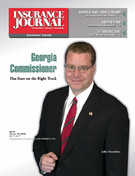Florida has long been considered a land of opportunity for companies seeking to expand into new markets, with its growing population, diverse economy, and expansive geography.
The state’s attraction for insurers has increased in recent years due to another key element: a business-friendly state government, personified Republican Governor Jeb Bush, and the expanding pro-business membership of the state legislature and executive branch. The most recent example of how this pro-business philosophy benefits insurers occurred in October, when the governor called legislators into special session to approve an economic development package, primarily benefiting Scripps Research Institute, which wants to locate a drug research center in Palm Beach County. Estimates are that the Scripps facility will bring 6,500 new jobs to the state; over time that is expected to grow to 50,000 jobs. Of course one thing that all of those new Floridians and the new businesses and services that support them will need is insurance.
As a former Florida insurance commissioner once said, “Insurance is the oil that keeps the economic engine running.” The challenge for insurers who want to keep the “oil” flowing is to respond as those interests threatened by a low tax, pro-business agenda unleash their own attacks.
One group that has effectively used three powerful institutions of government (legislature, courts, and ballot initiative process) in an attempt to derail Florida’s economy and healthy insurance market is the Florida Academy of Trial Lawyers.
The Academy has found success by pouring millions of dollars into campaigns for state legislative seats, funding campaigns of trial lawyers as well as non-lawyer candidates. This includes money for phone banks, advertising and direct mail – and the expertise to manage it all. In addition, the Academy gets involved in races by hosting fund-raisers and making independent expenditures on behalf of or against the (unnamed) candidate. Since 1996, the Florida Lawyers Action Group (the political arm of the Academy) has spent almost $7 million; in the 2002 Florida general election they spent $2.5 million for state races only.
Once elected, these legislators become advocates of the Academy’s anti-business positions, as evidenced this year by the Florida Senate’s (26 Republicans and 14 Democrats) refusal to support much of the business and insurance community’s legislative agenda. While business and insurance interests still can prevail on key issues – this year’s workers’ compensation reform bill is a good example – such victories are getting harder to come by.
Insurers should strengthen relationships with key Florida-based business organizations, including the Florida Association of Independent Agents, Associated Industries of Florida, and the Florida Chamber of Commerce, and support coordinated, well-funded programs for key legislative initiatives.
The trial bar also has used the judiciary to counter insurer successes. For example, after comprehensive tort reform legislation passed in 1999, the trial bar rushed to the courthouse, successfully challenging the statute’s constitutionality. Again this year, after the marathon special sessions called by Gov. Bush finally resulted in passage of a compromise medical malpractice bill, the Academy pledged to challenge the constitutionality of the damage caps. Clearly, court reform is as important as tort reform. Insurers must be actively involved in supporting fair-minded judicial candidates at both the trial and appellate levels.
Finally, the Academy has turned to an oft-used, and some say, over-used, citizen participation feature of the Florida Constitution: the initiative process. Earlier this year the Academy announced that they have launched a ballot initiative campaign with the goal of placing on the 2004 ballot six constitutional amendments that – if passed – would severely limit insurers’ ability to do business in the state of Florida.
The Academy reportedly has resorted to the ballot initiative strategy after experiencing what they consider to be several legislative defeats.
While there is always the possibility that the Academy will decide not to proceed with their campaign, insurers should prepare as if they will, since Florida’s growing reliance on the initiative process threatens not just our industry but the entire business community. The ballot initiative process takes debate over complicated public policy proposals away from the legislature, and reduces them to sound bites in multi-million dollar ad campaigns. Insurers need to make sure that decisions on issues we care about are made by public policy experts.
Beyond this latest challenge, insurers and the business community at large need to prepare now to counteract the Academy’s successes.
Otherwise, insurers will be left out in the cold in one of the country’s largest markets, which in Florida is not a positive forecast.
Cecil Pearce is vice president of the Southeast region for the American Insurance Association (www.aiadc.org/)
Was this article valuable?
Here are more articles you may enjoy.


 Nine-Month 2025 Results Show P/C Underwriting Gain Skyrocketed
Nine-Month 2025 Results Show P/C Underwriting Gain Skyrocketed  US Appeals Court Rejects Challenge to Trump’s Efforts to Ban DEI
US Appeals Court Rejects Challenge to Trump’s Efforts to Ban DEI  Married Insurance Brokers Indicted for Allegedly Running $750K Fraud Scheme
Married Insurance Brokers Indicted for Allegedly Running $750K Fraud Scheme  AIG Underwriting Income Up 48% in Q4 on North America Commercial
AIG Underwriting Income Up 48% in Q4 on North America Commercial 


